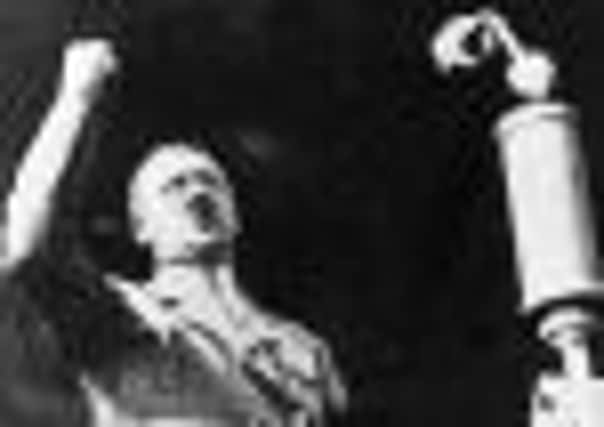War heroine breaks silence after 60 years


Now, having recently turned 90, a decorated veteran of the Dutch Resistance who has lived in Scotland for more than 60 years has spoken about her remarkable role during World War II.
Grietje Scott, who lives in the North Ayrshire town of Largs, has recalled the “very difficult” time when she helped foil the Germans in her homeland, by helping to hide crucial supplies and building an elaborate hiding place for Jewish exiles.
Advertisement
Hide AdAdvertisement
Hide AdThe grandmother of three, known as Kieks, has kept her heroism a secret for more than six decades, but spoke out after celebrating her 90th birthday last month in the town’s Homemount House care home.
Having been decorated by the Yad Vashem - an organisation set up to honour Dutch resistance veterans - Mrs Scott moved to Scotland after marrying Paisley man, Archie Scott, in 1948.
Now, their eldest son, Andrew, has written a book about his mother’s wartime experiences, prompting her to recall the crucial role she and her siblings played.
At the outbreak of war in 1939, Mrs Scott was a 17-year-old woman living in the suburbs of The Hague in Holland, with her mother, Truida, older sisters Truida, Ella, Trientje, and Martha, and brothers Willem, Ruurd, and Douwe.
The family installed a secret room in their home to house fleeing Jews to fool the Gestapo, with Willem disguising the entrance with a mirror.
They would use a downstairs buzzer if danger was nearby to sound the opening bars of Beethoven’s fifth symphony, also installing mirrors at right angles to the upstairs windows of the hidden room to allow Jewish families to look out without being seen.
The first fugitives came in 1942 when a Jewish couple, Solomon – known as Piet – and his wife, Lien, came to live with them. The couple were later joined by their two-year-old son, Abraham, renamed Jeintje to avoid suspicion.
They were later joined by a second couple brought by the nearby church, Joab and Geb Gardner, and in the summer of that year a Jewish man named Kurtle Levin, later renamed Chris, who scrambled through the house’s upstairs window and took shelter.
Advertisement
Hide AdAdvertisement
Hide AdThe growing household were supported by the Resistance as Mrs Scott’s mother worked as a courier and her brother, Douwe, as a forger, copying documents for escapees.
Recalling the events, Mrs Scott said yesterday: “I just did what I had to do. I wouldn’t call myself a hero. It was a very difficult time. I couldn’t talk about it for 40 years.
“When the Jews arrived on our doorstep we thought the war would end in six months. Once they came, we did our best to protect them, sharing our food and doing whatever we had to do to keep them and us safe. I’m just glad I could do something good.”
After the war, she was reintroduced to Mr Scott, whom she had first met before the conflict, and the pair married in 1948 before moving to Westerton, near Bearsden, East Dunbartonshire, where Mr Scott worked as a bank manager at the Royal Bank of Scotland in Glasgow.
The couple raised four children, Andrew, 58, David, 56, Ella, 50, and Christine, 50. In 1978, Mrs Scott was recognised for her bravery with a medal by the Israeli organisation Yad Vashem. Her husband died in 1988 and Kieks bought a flat in a Largs retirement home four years later.
Andrew, who still lives in Bearsden, has written a book about his mother’s experiences, entitled ‘A Roll in the Snow’.
He said: “I’m very proud of my mum. She had a very difficult time after the war, she has suffered from post traumatic distress disorder, but she has come through it.
“The Yad Vashem have said if you could reconstruct what my mother did in the Resistance you would epitomise what it meant to be in the Resistance.”
Dutch Resistance
Advertisement
Hide AdAdvertisement
Hide AdON 15 May 1940, one day after the bombing of Rotterdam, Dutch forces capitulated to invading German forces, and the Dutch government and royal family went into exile in London.
The Nazis deported the majority of the country’s Jews to concentration camps, and it is estimated that around three quarters of its Jewish population – around 110,000 people – died.
Although the Dutch Resistance movement developed relatively slowly, its counter-intelligence networks provided key support to Allied forces, before liberation on 5 May 1945.